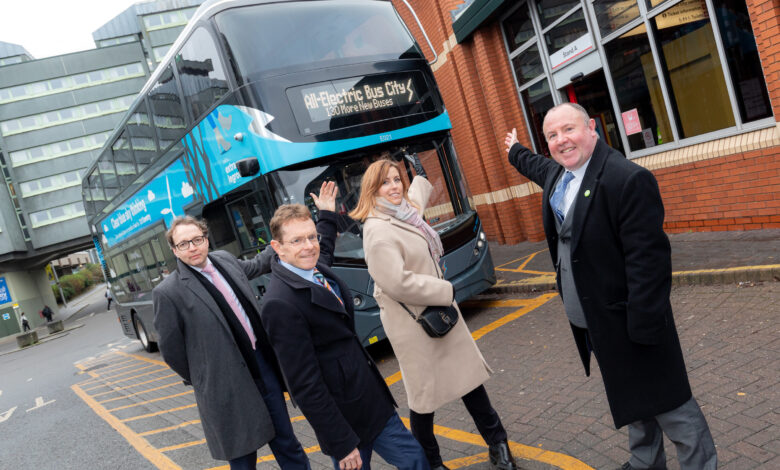First 130 buses ordered puts Coventry on road to becoming UK’s first all-electric bus city

Midlands: A fleet of 130 zero-emission double decker buses will be introduced next year as part of a £140 million project to make Coventry the UK’s first all-electric bus city.
National Express Coventry has ordered the brand-new British built zero-emission buses to enter into service in early 2023, helping improve air quality and reduce carbon emissions in the city.
Last year Transport for West Midlands (TfWM), which is part of the West Midlands Combined Authority (WMCA), secured £50 million funding from the Department of Transport to ensure every bus in Coventry is zero-emission.
Now under a deal with TfWM, National Express Coventry is making an additional multi-million pound investment into the All Electric Bus City project with the purchase of the 130 new buses. The company is set to order further buses at a later date.
Similar agreements with other bus companies and those running subsidised services are likely to follow, with the aim of putting up to 300 electric buses on the streets of Coventry, guaranteeing an all-electric fleet by 2025.
In addition to new vehicles, TfWM is also working with Coventry City Council to create the necessary charging infrastructure to power the new buses. This will include upgrades to bus depots and charging points at Pool Meadow Bus Station.
As part of the West Midlands Bus Alliance, National Express Coventry and other bus operators work closely with TfWM and Coventry City Council to provide reliable, affordable and green bus services to residents and visitors across the city.
Andy Street, the Mayor of the West Midlands and chair of the WMCA, said: “It really is incredibly exciting to think next year we will have 130 all-electric buses on the streets of Coventry thanks to the deal we have signed with National Express.
“These clean and green double decker buses will not only be fantastic for passengers with their comfort and state-of-the-art technology, but it will also help in reducing air pollution and tackling the climate emergency.
“Buses are the backbone of transport in the West Midlands, and a key part of the public transport revolution we have been undergoing in recent years. So I am delighted we have been able to make yet another landmark investment as we look to build on our pre-pandemic levels of patronage – where the West Midlands was the only region that saw a rise in bus passenger numbers.”
Roads Minister Baroness Vere added: “As we continue working to decarbonise our transport network, I’m delighted part of our £50m investment is funding one of the largest orders of electric buses the country has seen.
“This money will help revolutionise Coventry’s bus services, providing cleaner ways of getting around, better air quality and reduced carbon emissions as we look towards a net-zero future.”
New and existing bus users will enjoy a smoother, greener, more inclusive transport experience with improvements in accessibility, as well as better comfort and information while on the move.
David Bradford, managing director of National Express Bus, said: “We are really looking forward to launching 130 more of our fully electric buses into service early next year on the way to making Coventry the UK’s first all-electric bus city.
“Ten of our existing electric double decker buses have already driven over 850,000 miles and saved 1,400 tonnes of carbon dioxide from going out into the atmosphere. Hundreds more of these zero-emission buses are now on their way. It is really great news for Coventry residents and visitors.
“By working together with TfWM and Coventry City Council we are committed to driving improvements for our customers, as well as contributing to huge health and mobility benefits for people right across Coventry.
“Buses are already one of the cleanest ways to travel. National Express has the cheapest bus fares in England, alongside flexible ticketing, so our new and existing customers can relax knowing that they are doing their bit for the planet if they leave the car at home and travel by bus.”
Cllr Jim O’Boyle, cabinet member for jobs, regeneration and climate change, at Coventry City Council, said: “Since the £50m investment was announced we have been working with TfWM and National Express to begin to develop the infrastructure for up to 300 all-electric buses by 2025.
“Confirming the order of 130 of these state-of-the art buses – which will be here by early 2023 – is fantastic for local people, for business in the city, and most importantly, for our efforts to lead on the green industrial revolution and cut our carbon footprint.
“We already have a range of schemes to improve air quality, including the highest number of electric charging points per head of population outside London, and this will help exceed our carbon reduction targets. There are a number of partners involved and it highlights the excellent joint working relations between the different organisations.
“We are very proud to say that Coventry will be the country’s first all-electric bus city.”
Investment in green and clean transport is a key part of plans to achieve the #WM2041 target for a zero-carbon region.
National Express Coventry has been operating 10 fully electric buses across the city since summer 2020. In 2019, Coventry City Council was awarded £2.2 million from the government’s Ultra-Low Emission Bus Scheme to fund the 10 new electric buses and supporting infrastructure.
Each of the 10 buses can charge up in four hours and can run for 220 kilometres in the winter or 280 kilometres in the summer before needing another charge.
The bus company’s depot near Pool Meadow Bus Station has solar panels fitted which harvest renewable energy during the day and help to recharge the electric buses overnight. Each electric bus has its own charging station. Coventry depot engineers can monitor the buses’ performance in real-time on an app on their phones.
Drivers have to be specially trained to drive electric buses because they behave differently to combustion engine-driven buses. The drivers learn to preserve the charge for as long as possible and extend the range of the vehicle.





